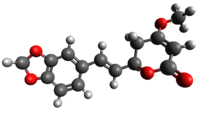Methysticin
From Wikipedia, the free encyclopedia
 |
|
 |
|
| Names | |
|---|---|
| IUPAC name
(2R)-2-[(E)-2-(1,3-Benzodioxol-5-yl)ethenyl]-4-methoxy-2,3-dihydropyran-6-one
|
|
| Identifiers | |
| 495-85-2 |
|
| 3D model (Jmol) | Interactive image |
| ChemSpider | 4444889 |
| KEGG | C09952 |
| PubChem | 5281567 |
|
|
|
|
| Properties | |
| C15H14O5 | |
| Molar mass | 274.27 g·mol−1 |
|
Except where otherwise noted, data are given for materials in their standard state (at 25 °C [77 °F], 100 kPa).
|
|
| Infobox references | |
Methysticin is one of the six major kavalactones found in the kava plant.[1] Research suggests that methysticin and the related compound dihydromethysticin have CYP1A1 inducing effects which may be responsible for their toxicity.[2]
Toxicity[edit]
Methysticin induces the function of the hepatic enzyme CYP1A1, an enzyme involved in the toxification of benzo[a]pyrene into (+)-benzo[a]pyrene-7,8-dihydrodiol-9,10-epoxide, one of the most highly carcinogenic substances known. This property is shared by the related compound dihdromethysticin, both of which occur in significant quantities in Piper methysticum.[2][3][4]
References[edit]
- ^ Malani, Joji (2002-12-03). "Evaluation of the effects of Kava on the Liver" (PDF). Fiji School of Medicine. Retrieved 2009-09-04.
- ^ a b Li Y, Mei H, Wu Q, Zhang S, Fang JL, Shi L, Guo L (Dec 2011). "Methysticin and 7,8-dihydromethysticin are two major kavalactones in kava extract to induce CYP1A1.". Toxicological Sciences. 124 (2): 388–99. doi:10.1093/toxsci/kfr235. PMID 21908763.
- ^ Beresford, AP (1993). "CYP1A1: friend or foe?". Drug Metab Rev. 25 (4): 503–17. doi:10.3109/03602539308993984. PMID 8313840.
- ^ Uno, S; Dalton TP; Durkenne S; Curran CP (2004). "Oral exposure to benzo[a]pyrene in the mouse: detoxication by inducible cytochrome P450 is more important than metabolic activation.". Molecular Pharmacology. 65 (5): 1225–37. doi:10.1124/mol.65.5.1225. PMID 15102951.